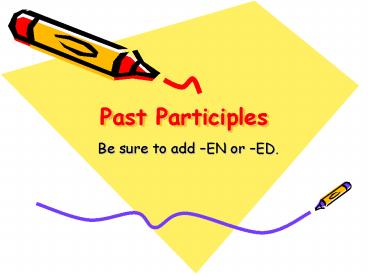Past Participles - PowerPoint PPT Presentation
1 / 20
Title: Past Participles
1
Past Participles
- Be sure to add EN or ED.
2
Whats a Past Participle?
3
(No Transcript)
4
(No Transcript)
5
(No Transcript)
6
(No Transcript)
7
(No Transcript)
8
(No Transcript)
9
(No Transcript)
10
(No Transcript)
11
Can You Find the Student Errors?
- Advance math
- Car gets broke.
- Car broked down
- Your dreamed car is over here.
- Inexperience buyers is poor.
- Teachers have helping us.
- Items are damage
- Car is purchase
- Do not realized
- Names to be wear
- Get prepare
- Need to be cover
12
Here are the corrections
- Advanced math
- Car gets broken
- Car broke down
- Your dream car is over here.
- Inexperienced buyers is poor.
- Teachers have been helping us.
- 7. Items are damaged
- 8. Car is purchased
- 9. Do not realize
- 10. Names to be worn
- 11. Get prepared
- 12. Need to be covered
13
How Are Present Participles Used?
- Present participles are used to reduce adjective
clauses with active verbs - George Bush, who became president in 2000, is the
chief executive. - George Bush, becoming president in 2000, is the
chief executive.
- Can you fix all of the participial errors?
- Entered the class, the professor began lecturing.
- It was a bad day for Emilia, felt as she did
about her hair style. - Then Juan, knew her feelings, began laughing very
loudly.
14
How Present Participles Are Used
- Notice that each present participle phrase
connects with and explains about a person.
- All of the participial errors are corrected
- Entering the class, the professor quickly began
lecturing on participles. - It was a bad day for Emilia, feeling as she did
about her odd hair style. - Then Juan, knowing her feelings, began laughing
very loudly.
15
Can You Use Participial Clauses?
- Past participles are used to reduce adjective
clauses with passives. - Is the clause below better or the phrase?
- Dalton State, which was started in 1967, is a
four-year, public college. - Dalton State, started in 1967, is a four-year
public college.
- Reduce each clause to a phrase
- The president who was elected years ago will be
replaced. - Every student that scored 80 on the COMPASS
laughed. - Most of the teachers who began the college are
now gone. - The last exam which is almost forgotten was
fairly difficult.
16
Can You Use Participial Clauses?
- To reduce clauses to phrases, remove the subject
and the verb. - After all, a clause must have a subject and a
verb, but a phrase cannot have both of them.
- Clauses are here reduced to mere phrases
- The president elected years ago will be replaced.
- Every student scoring 80 on the COMPASS laughed.
- Most of the teachers beginning the college are
now gone. - The last exam almost forgotten was fairly
difficult.
17
Can you select participles?
- The largest (known, knowing) animal is the blue
whale. - My assistant (worked, working) in this program is
in the language lab. - A watch is an instrument (used, using) to measure
the time. - (Made, making) in 2000, this building is several
years old. - Helen left the class, (thought, thinking) that
her best friend had not supported her at all.
18
Can you use participles?
- Have you (see) ___ my car keys?
- No, where have you (lay) ___ them?
- I havent (find) ___ them yet!
- Well, have you (try) __ the table?
- Oh, have you (drive) ___ my car?
- Sure, I have (test) ___ it out lots of times!
- How has it (be) __ running for you.
- The car has (run) __ very well.
19
Here are the participles
- Have you seen my car keys?
- No, where have you laid them?
- I havent found them yet!
- Well, have you tried the table?
- Oh, have you driven my car?
- Sure, I have tested it out lots of times!
- How has it been running for you.
- The car has run very well.
20
Can you use irregular participles?
- Its too early Juan has not (awake) __.
- All night long, the wind has (blow) __.
- Theres no more time have you (chose) __?
- Look at the picture that she has (draw) __.
- Ice skating? Have you already (fall) __?
- She has her money and it is now (hid) __.
- Ed is on the sofa he has (lie) __ down.
- Wake up the sun has already (rise) __.
- A thief entered and the cash is (steal) __.
- How many outfits are (wear) __ by stars?































